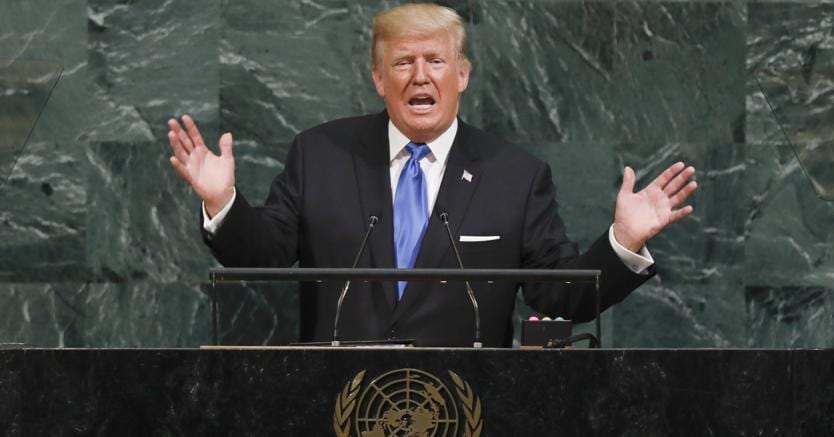Diplomacy in the Trenches
The apple of discord, Ukraine, seems like it could become another reason for further deterioration of the relationship between Russia and the U.S. To tell you the truth, the not so rosy relationship with Washington has become almost entirely contentious since 2014.
Heather Nauert, U.S. State Department press secretary, stated that the only acceptable option for the U.S. is to have United Nations peacekeepers on the border of Ukraine and the Russian Federation. “Any such force should have a broad mandate for peace and security throughout the occupied territory of Ukraine up to and including the border with Russia in order to avoid deepening or institutionalizing the divisions inside Ukraine,” Nauert said.
The Americans follow the Ukrainians in pretending that the Minsk agreements simply don’t exist. But if there were no agreements, then it might be asked, why bring them up when Russia tries to come out on the side of the Donbass Republic? Obviously, the “pragmatism” and “double standards” aren’t so clear after all.
Nauert believes that the deployment of a U.N. peacekeeping force promotes the restoration of “Ukrainian sovereignty and also territorial integrity.” That is to say, Americans don’t need peace, but rather Ukrainian territorial integrity. If only you knew how concerned the Europeans were with the peace process.
The leader of the Luhansk People’s Republic has already opposed the deployment of a U.N. detachment on its border with Russia. “There will not be a detachment on our border with Russia. We don’t have a problem on that border. Consequently, we don’t need those peacekeepers…” Those are the words of Vladislav Deynevo, the Luhansk People’s Republic’s Minister for Foreign Affairs. A similar position should be expected from the Donetsk People’s Republic.
It’s important to understand the differences in the objectives of those who want to put the Blue Helmets in Russia and Ukraine.* The first speaks only about the security of the Organization for the Security and Cooperation of Europe, while the second speaks about providing order and territorial control of Donbass. Basically, in the Russian version, the U.N. peacekeepers aren’t exactly peacekeeping, but protecting OSCE personnel monitoring the conflict.
In the Russian version, peacekeepers on the Russian-Donbass border aren’t necessary. There aren’t any military clashes there, and thus no OSCE personnel. In addition to a 218-mile line of demarcation, there is also a 186-mile border. How are the Blue Helmets going to control all of it, without understanding that this represents an unprecedented scale and expense, even larger than the conflict in Bosnia and Herzegovina?
Obviously the Americans think Russia is bluffing, and they are waiting until Moscow completely gives up on its idea of the OSCE protecting the line of demarcation. The Kremlin will not back down and intends to strongly defend its position, but the Americans are considering new methods of coercion. It should be called diplomacy in the trenches. Both countries believe they are right, and both have similar strengths. But there are some factors to consider. Russia is more inflexible, but confrontation in the highest administrative offices of the U.S. has not disappeared. Trump still hasn’t conveyed his wishes. You’ll hear anything you want from him if you wait long enough – from direct indications of Ukrainian aggression to rhetorical promises to aim missiles at Moscow. This is how the situation in the White House will proceed, whether or not the American president finds the strength to resist the establishment.
There’s still one more important point in Nauert’s speech. It’s about the supposed solidarity between the U.S. and Germany regarding the U.N.’s detachment to the border between Russia and Donbass. Neither German Minister for Foreign Affairs Sigmar Gabriel, nor Chancellor Angela Merkel, gave a reason as to why this allegedly coincidental alignment in point of views on the solution was somehow noticed. The Germans welcomed Putin’s invitation to openly speak about possibly lifting sanctions against Moscow. Even such a traditional opponent to Russian foreign policy strategies such as the German Free Democratic Party and its leader, Christian Lindner, recognizes the necessity of strengthening ties with Russia. Even Macron is ready to seize the chance to settle the Ukrainian conflict differently than the United States.
Presently, it is important for Russia to confront the opinions of European leaders, point out its intention to end the conflict once and for all, and contribute to the restoration of previous economic ties. The Americans are still the hegemons of the world, but Ukraine and Donbass are still European political areas. And the diplomatic possibilities for the cozy European countries are still as strong as ever.
*Editor’s note: Blue Helmets refer to members of United Nations peacekeeping missions who wear light blue berets or helmets.

